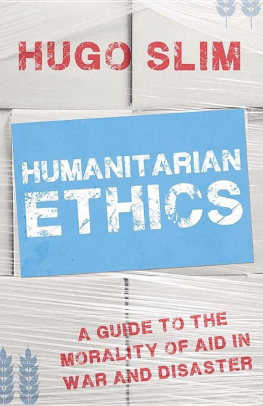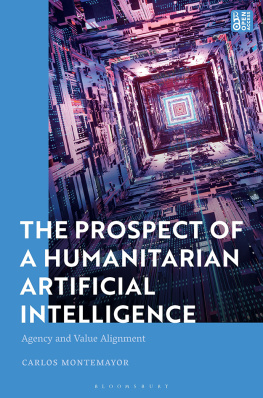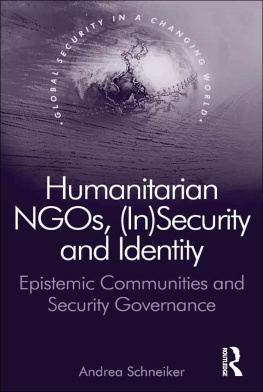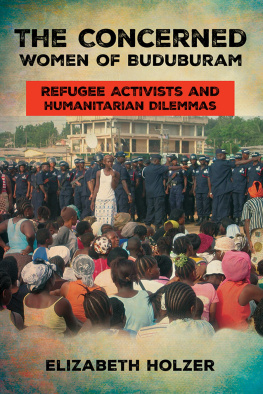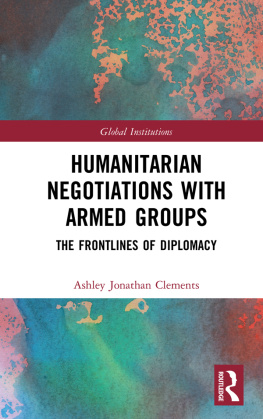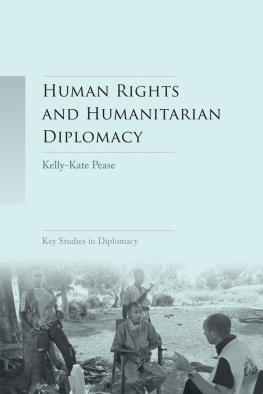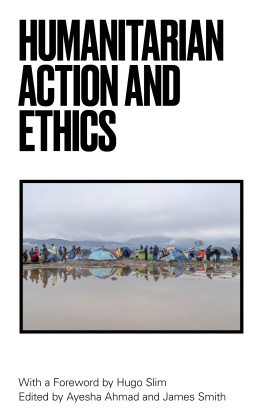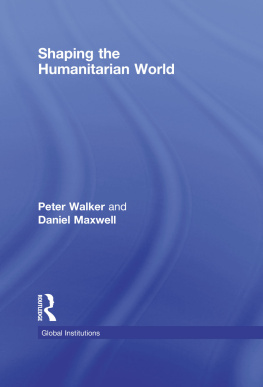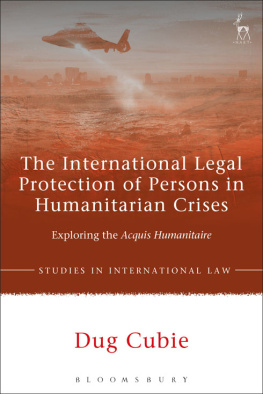HUMANITARIAN ETHICS
HUGO SLIM
Humanitarian Ethics
A Guide to the Morality of Aid in War and Disaster


Oxford University Press is a department of the University of Oxford. It furthers the Universitys objective of excellence in research, scholarship, and education by publishing worldwide.
Oxford New York
Auckland Cape Town Dar es Salaam Hong Kong Karachi
Kuala Lumpur Madrid Melbourne Mexico City Nairobi
New Delhi Shanghai Taipei Toronto
With offices in
Argentina Austria Brazil Chile Czech Republic France Greece
Guatemala Hungary Italy Japan Poland Portugal Singapore
South Korea Switzerland Thailand Turkey Ukraine Vietnam
Oxford is a registered trade mark of Oxford University Press in the UK and certain other countries.
Published in the United States of America by Oxford University Press
198 Madison Avenue, New York, NY 10016
Copyright Hugo Slim, 2015
All rights reserved. No part of this publication may be reproduced, stored in a retrieval system, or transmitted, in any form or by any means, without the prior permission in writing of Oxford University Press, or as expressly permitted by law, by license, or under terms agreed with the appropriate reproduction rights organization. Inquiries concerning reproduction outside the scope of the above should be sent to the Rights Department, Oxford University Press, at the address above.
You must not circulate this work in any other form and you must impose this same condition on any acquirer.
Library of Congress Cataloging-in-Publication Data is available Slim, Hugo
Humanitarian Ethics/A Guide to the Morality of Aid in War and Disaster
ISBN 978-01902-6483-3
eISBN 978-01906-1332-7
For Jessie and Solomon
CONTENTS
This book is the result of a truly cooperative effort. I just wrote it. Many other individuals and organizations helped to inform it, fund it and support it in a wide variety of ways. John Mitchell reminded me that many humanitarian workers are still unclear about humanitarian ethics and encouraged me to revisit the subject. Michael Dwyer at Hurst suggested that I write this book and has been extremely patient and encouraging throughout. Jennifer Welsh, David Rodin and Dapo Akande at the University of Oxfords Institute of Ethics, Law and Armed Conflict (ELAC) kindly hosted the Humanitarian Ethics Project here at Oxford. Several humanitarian organizations generously funded the project and engaged actively in roundtables that we held to discuss particular aspects of humanitarian ethics. The British Red Cross Society, Oxfam GB, Save the Children UK, World Vision, CAFOD, Islamic Relief and World Jewish Relief all co-financed the project while the International Committee of the Red Cross, Mdecins Sans Frontires, Action Contre le Faim, ALNAP, Help Age International and Norwegian Refugee Council also joined in our roundtable discussions. In these organizations several people have been especially engaged and supportive, notably: Sorcha OCallaghan, Ajay Madiwale, Amelia Kyazze, Jane Cocking, Nigel Timmins, Jasmine Whitbread, Gareth Owen, Juliano Fiori, Ian Gray, Jules Frost, Matthew Carter, Catherine Mahony, Atallah Fitzgibbon, Paul Anticoni, Richard Verber, Paul Bouvier, Mona Sadek, James Darcy, Pauline Chetcuti, Sara Tesorieri, Michael Neuman, Andrew Collodel, Paul Knox Clarke, Dan Hodgkinson helped early on with important research assistance. Jane Leek and Mark Vogt gave me invaluable support. A number of other people gave me important guidance: Greg Johnson, Cheyney Ryan, Jim Astman, Judith Rosen-Berry, Sujata Godkar-Wilcox, Mark Philp, Kalypso Nicolaidis, Emilie Parry, Alex Leveringhaus, Ruben Reike, Janina Dill and Fernando Almansa. My many students at the Centre for Education and Research in Humanitarian Action (CERAH) in Geneva and at the University of Oregon have helped to bring some realism to my appreciation of the subject. Janice French, Rasangi Prematilaka, Julie Page and Liz Greenhalgh in the Department of Politics and International Relations at Oxford have been extremely patient with my inaptitude for administration. Stephen Whitefield and Elizabeth Frazer have been very supportive department heads. Writing up of this research also received funding from the European Research Council as part of the project on the Individualization of War.
My greatest thanks for her help with this book goes to my Research Assistant, Anais Resseguier, who has given me such expert support and led me to so many important texts and ideas. Anais encouragement and good humour have been essential throughout, and she has been most tolerant of my unconventional academic approach and my inability to understand French postmodern ethics.
Many other people have helped me by their kindness. My children, Jessie and Solly, to whom this book is dedicated, have taught me much about humanitarian ethics over the years. Sarah Whyte very kindly gave me a beautiful place to write in Devon whenever I needed it. The Warden, Fellows and staff at Merton College, Oxford have given me a warm welcome into their Senior Common Room, their chapel and their beautiful college. Rene, Richard, Linda, Mariana and Dickie in the caf at Manor Road have been a vital source of coffee, smiles and encouragement. Others have been valuable friends to me during this time of writing. Timothy Radcliffe, Richard Finn, Richard Ounsworth and the community at Blackfriars; Nicholas King at Campion Hall; George Levvy, Michael Holyoke, Catherine Clarke, Anne Millais, Mari Pritchard, Lesley Burt, Serena Momberg, Adrian James, Alan Goodwin, David Alexander, Chris Cramer, Nabeel Hamdi, Janie Frazer, Colin Farrant, Mary Ann Slim and, most especially, Asma Awan.
Oxford, Advent 2014 H.S.
| ALNAP | Active Learning Network for Accountability and Performance |
| CERAH | Centre for Education and Research in Humanitarian Action |
| EPLF | Eritrean Peoples Liberation Front |
| ERD | Emergency Relief Desk |
| FPIC | Free, prior and informed consent |
| HAP | Humanitarian Accountability Project |
| ICC | International Criminal Court |
| ICRC | International Committee of the Red Cross |
| IDRL | International Disaster Relief Law |
| IDP | Internally Displaced Person |
| IHL | International Humanitarian Law |
| LGBT | Lesbian, gay, bisexual or transgender people |
| MSF | Mdecins Sans Frontires (Doctors without borders) |
| NGHA | Non-Government Humanitarian Organizations |
| NGO | Non-Government Organization |
| OECD | Organization for Economic Co-operation and Development |
| SARC | Syrian Arab Red Crescent |
| SPLA | Sudan Peoples Liberation Army |
| TPLF | Tigrayan Peoples Liberation Front |
| UDHR | Universal Declaration of Human Rights |
| URD | Urgence Rhabilitation Dveloppement |
| Agencies within the United Nations |
| UNDP | United Nations Development Programme |
| UNFAO | United Nations Food and Agricultural Organization |
| UNHCR | United Nations High Commissioner for Refugees |
| UNICEF | United Nations Childrens Fund |

